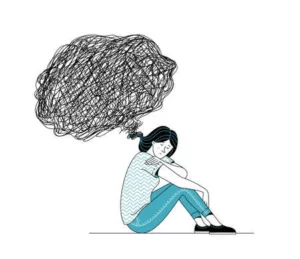We all know that OCD is characterized by obsessive thoughts and compulsive behaviors. But what you may not know is that there is a dark side to OCD: rumination. Rumination is the act of obsessively thinking about a particular topic or problem over and over again. This can be extremely harmful, both mentally and emotionally. In this blog post, we will discuss the dangers of rumination, as well as strategies for overcoming it.
Contents
What Is OCD Rumination?

OCD rumination is a form of OCD that is characterized by obsessive thoughts. These thoughts can be about anything, but they often center around a particular topic or problem. Rumination can be extremely harmful, both mentally and emotionally. It can lead to anxiety, depression, and even suicide.
Types
There are two types of OCD rumination: primary and secondary.
Primary OCD rumination occurs when the person obsessively thinks about a particular topic or problem without any external triggers.
Secondary OCD rumination occurs when the person obsessively thinks about a particular topic or problem in response to an external trigger (such as seeing someone with OC symptoms).
Causes Of OCD Rumination
There is no single cause of OCD rumination. It is thought to be a combination of genetic and environmental factors.
Several risk factors may increase your chances of developing OCD rumination. These include:
- Having a family history of OCD or other mental disorders
- Experiencing trauma or abuse
- Having another mental disorder, such as anxiety or depression
- Using certain drugs or alcohol
- Abnormal regulation of brain hormones
- Witnessing unfortunate events like death, accident, or natural disaster
Signs Of OCD Rumination
Several signs can indicate someone is struggling with OCD rumination. These include:
- Excessive worrying about a particular topic or problem
- Obsessing over what could happen in the future
- Trying to come up with solutions to a problem that doesn’t exist
- Obsessive about maintaining hygiene
- Fearing situations that may lead to conflict
- “why” questions about profound and philosophical ideas
- Constantly thinking about something negative that happened in the past
- Avoiding people, places, or things that trigger thoughts about the obsessions
- Isolating oneself from friends and family
- Fear of losing valuables
- Inappropriate sexual thoughts
- Questioning supreme authorities like religion or the government
- Intense need to achieve perfectionism
- Experiencing anxiety, depression, or other mental health issues
Effects of OCD Rumination

OCD rumination can be extremely harmful, both mentally and emotionally. It can lead to anxiety, depression, and even suicide.
- Rumination can also make OCD symptoms worse. Rumination is one of the main reasons why people with OCD do not get better with treatment.
- One of the dangers of OCD rumination is that it can keep you from focusing on anything else. When you obsessively think about a particular topic or problem, it can be hard to focus on anything else. This can make it difficult to work, study, or even enjoy your hobbies.
- Additionally, rumination can make it difficult to sleep and eat properly.
- Another danger of OCD rumination is that it can make you feel isolated and alone. When you obsessively think about a particular topic or problem, you may start to feel like nobody else understands what you’re going through. This can lead to isolation and loneliness.
- Additionally, the stigma and lack of awareness can make you less likely to seek out treatment for your OCD.
- Finally, OCD rumination can be dangerous because it can lead to suicide. Rumination can cause anxiety and depression, which can lead to suicidal thoughts and behaviors. If you are struggling with OCD rumination, it is important to seek help from a mental health professional immediately.
Tips For Overcoming OCD Rumination
If you are struggling with sexual orientation OCD, there is hope! There are a variety of effective treatment options available.
Therapy
Cognitive Behaviour Therapy (CBT) – CBT is a type of psychotherapy that provides you with tools to think, act, and react to your negative and obsessive thought patterns. The ultimate goal is to replace any negative thoughts with positive/productive ones.
Exposure and Response treatment (ERP) – ERP therapy is designed in a way that helps the individual control and tolerate the anxiety associated with obsessive thoughts and simultaneously not allow them to act on a compulsion to reduce that anxiety. This treatment exposes you to situations that trigger your OCD.
Mindfulness-Based Behavioural Therapy (MBBT) – Informal mindfulness training along with exposure and response prevention (ERP) is incorporated with a writing intervention focusing on both behavior and mindfulness components that contribute to treatment effectiveness.
Self Help
If you are struggling with OCD rumination, several self-help strategies can help.
- First, it is important to keep track of your thoughts. Who or what triggers your thoughts, what specific time do you feel stuck in thoughts, or if there is a specific stimulus that onsets the ruminating thoughts. Keeping track of these events will also help you gain an idea about your patterns of thoughts.
- Second, you can try to distract yourself from your rumination. This may seem difficult at first, but there are many ways to do it. You can try focusing on a different task, listening to music, or spending time with friends and family.
- Third, you can try to challenge your rumination. When you find yourself obsessing over a particular topic or problem, ask yourself if there is any evidence that supports your thoughts. If not, try to come up with evidence that disproves your thoughts. This can also help you see that your rumination is not based on reality and can help you let go of it.
- Fourth, you can practice mindfulness. Mindfulness is a technique that involves paying attention to the present moment without judgment. When you find yourself ruminating, try to focus on your breath and the sensations in your body. This can help you ground yourself in the present moment and further stop your rumination from taking over.
- Fifth, make sure to take care of yourself both physically and emotionally. Rumination can be taxing on your body and mind, so it is important to take care of yourself. Make sure to eat healthy meals, exercise regularly, and get enough sleep. Additionally, it is important to find healthy ways to cope with stress and anxiety. This may include yoga, meditation, or journaling.
Conclusion
OCD rumination can be a difficult and dangerous thing to deal with. However, many strategies can help you overcome them. If you find yourself struggling with OCD rumination, reach out for help from a mental health professional.
If you are looking for affordable Online OCD Counseling MantraCare can help: Book a trial OCD therapy session


